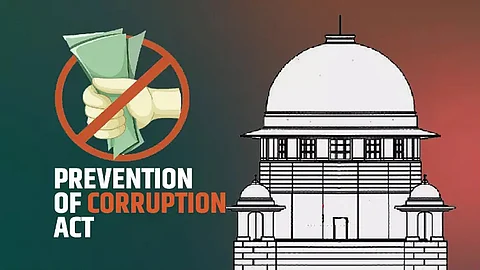

New Delhi | The Centre on Wednesday informed the Supreme Court that a provision of the anti-graft law, which mandates prior approval for starting probe against government officials in corruption cases, was an attempt of legislature to have "fearless governance".
The government informed a bench of Justices B V Nagarathna and K V Viswanathan that "fearless good governance" was also a "very fundamental part of any constitutional governance".
The bench then reserved its verdict on a plea challenging the constitutional validity of Section 17A of the Prevention of Corruption Act which mandates prior approval to start investigation against government officials in corruption cases.
"(Section) 17A, the way it is couched, in the most restrictive manner is one more attempt of the legislature to have fearless governance ensuring honest officers are not punished and dishonest officers do not go scot-free," Solicitor General Tushar Mehta said.
The bench enquired about the number of corruption complaints received since the amended Section 17A of the Act came into force in 2018.
Mehta said he could give figures of complaints that were received by the CBI.
He said approval was granted in 60 per cent of the complaints.
Advocate Prashant Bhushan, appearing for petitioner NGO Centre for Public Interest Litigation, said, "So in last six years, they say that 2,395 complaints came for either preliminary inquiry or investigation." "They say out of these, they declined 989 references, roughly 41 per cent, and approved 1,406 references," added Bhushan.
Mehta said reasoned orders were passed while either granting or refusing approval.
He said ultimately, these orders could be a subject matter of judicial scrutiny and the aggrieved party could always challenge it.
"Now, in the present day of this aggressive activism, if I may use that expression, the moment it is refused, the complainant comes with RTI. He comes with documents and he immediately rushes to the court challenging non-grant of approval," Mehta said.
He said the officers were very careful in either granting or refusing approval.
The bench also heard Bhushan's rejoinder.
"Possibly, he (petitioner) would now take your lordships to laying down some guidelines, etc. Please avoid doing that. There is no vacuum. There are judicial pronouncements on the subject and the statutory regime in place," Mehta said.
Bhushan said preliminary enquiry on a complaint would reveal whether there was any substance in it or not.
"Why should they (honest officers) be exposed to such harassment?" the bench asked.
It also pointed out a situation in which honest bona fide decisions taken by officers were met with frivolous allegations.
Bhushan said there was no harassment, no coercive action, no arrest, no search or seizure at the stage of preliminary enquiry.
He referred to an apex court judgement which struck down a provision of the Delhi Special Police Establishment (DSPE) Act, 1946.
He said then the issue was examined threadbare by a five-judge bench.
"It would be totally improper and a violation of judicial discipline if this court were to say that we feel that this protection needs to be given to honest officers," Bhushan said.
Justice Viswanathan then said, "Unless we agree with you, we violate judicial discipline?" Bhushan submitted he was not saying that.
"To say that unless you go my way or the highway, you are committing impropriety, is completely unjustified," Justice Viswanathan said.
Mehta in the beginning of the hearing said he had a detailed discussion with the director and joint director of CBI and prepared a short note relating to the probe agency selecting human resources.
He said experts from different fields, including bank, finance and other department were taken to provide their expertise on deputation basis.
While hearing the arguments on August 5, the bench stressed on striking a balance to protect honest government servants discharging their official functions from frivolous complaints while ensuring corrupt officers were not shielded.
